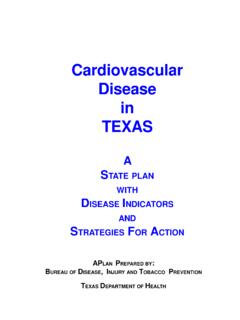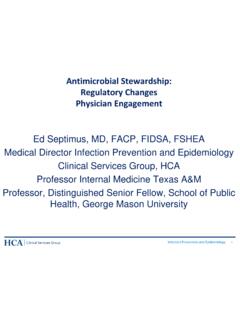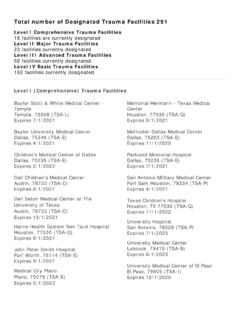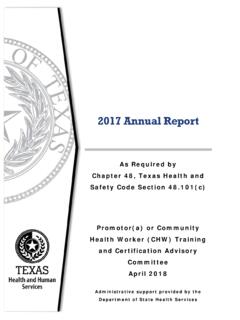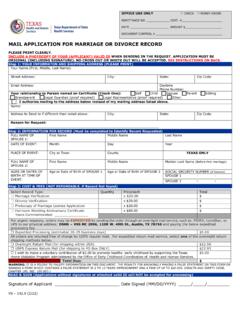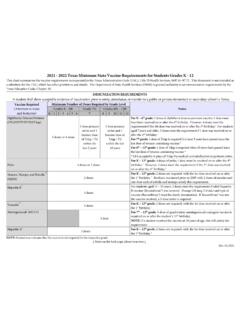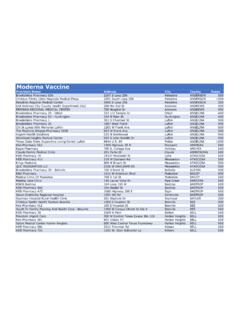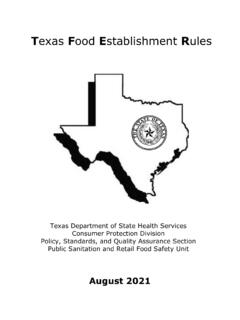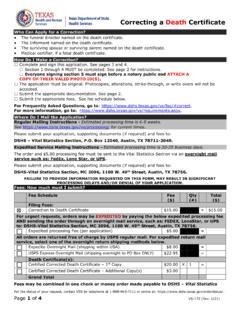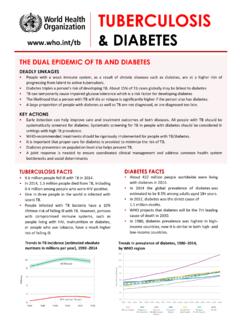Transcription of What if someone says they’ve already been treated for ...
1 What if someone says they've already been treated for latent tuberculosis infection (LTBI) or active tuberculosis disease (TB)? Please note that this document is only meant to provide guidance. If you have questions or concerns, please contact the Team or the Texas Department of State Health Services. What if you are screening someone and he or she says they were already treated for latent tuberculosis infection or active tuberculosis disease ? Most people know if they've had a tuberculosis skin test in the past, and even know if it swelled up, but many are confused about whether they were treated .
2 Patients can bring this up when you ask them about screening for LTBI, or they may not remember until you've already screened them and their test is positive. If they did receive treatment, their test may stay positive or reactive but it doesn't mean they need to be treated again unless they are exposed to tuberculosis again. So, it's important to figure out whether or not they've really been treated in the past, so that you know whether or not to recommend IGRA testing ( T Spot or QuantiFeron ) if they haven't been tested yet or treatment if they were tested and it was positive or reactive.
3 First, ask the patients if they remember what the name(s) of the medicine(s) were. Here are some questions you can ask patients to determine whether or not they've been treated : How long did you take the medicine? Treatment for LTBI lasts between 4 and 12 months, with typical treatments being 9. months long. The 12-dose regimen, where you take around 9 pills once a week for 12. week, has only been around for a few years. So, if they tell you they took pills for a few weeks, or anything once daily for less than 4.
4 Months, that probably wasn't treatment for LTBI and you should recommend treatment. How many pills did you take and how often did you take them? Treatment for LTBI is usually one pill or two every day. The 12-dose regimen, where you take around 9 pills once a week for 12 week, has only been around for a few years. So, if someone tells you they had to take a bunch of pills daily for many months, particularly if they say they did it by directly observed therapy, then that was probably treatment for active tuberculosis disease .
5 You can confirm their treatment with Texas Contact Information Diana M Cavazos, MSN, RN Zandra Perez, MSN, RN. 210-716-9592 v2 Aug 1, 2016 210-478-8184. Department of State Health Services with the assistance of our RNs (contact info below) and you would screen these people with a symptom check and chest x ray, not an IGRA test ( T Spot or QuantiFeron ). Did anyone have to watch you take the pills? In the past, only active tuberculosis disease treatment happened by directly observed therapy, where a health professional watches the patient take the pills, not LTBI.
6 Treatment. Now, with the once daily, twelve-week regimen, some patients may have received about 9 pills once a week by directly observed therapy for LTBI. So, if a patient describes a health professional watching them take pills daily, or three times a week, that was probably treatment for active tuberculosis disease . You can confirm their treatment with Texas Department of State Health Services and you would screen these people with a symptom check and chest x ray, not an IGRA test ( T Spot . or QuantiFeron ).
7 Please call us if you want help finding out if someone was treated for active tuberculosis disease in the past. Who gave the pills to you? Most of the time, treatment for LTBI comes from a primary care provider. Treatment for active tuberculosis disease usually comes from a doctor from the health department, a pulmonologist, or an infectious diseases doctor, though many people have a hard time telling the difference between types of doctors. If the treatment came from someone from the health department, you can check with the Texas Department of State Health Services to find out what the patient was treated for, and if they completed the treatment.
8 This could help you decide whether to offer screening treatment for LTBI. General principles: If someone was treated for LTBI in the past, they do not need treatment again, even if their tuberculosis test (skin test or IGRA) is positive or reactive . The exception is if they are re- exposed to someone with tuberculosis and someone from the Department of Health decides that re-treatment is indicated. How long and how frequently the patient took the pills can help you decide if it was LTBI. treatment. If they took the treatment daily for anything less than 4 months, it either wasn't LTBI.
9 Or active tuberculosis disease treatment or they didn't finish the treatment, and should be treated again. Contact Information Diana M Cavazos, MSN, RN Zandra Perez, MSN, RN. 210-716-9592 v2 Aug 1, 2016 210-478-8184.
